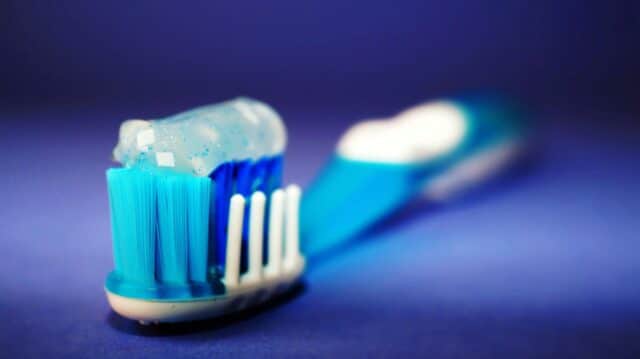Dental implants are a popular, long-term treatment option for tooth loss. Several studies show dental implants have a 90–95% success rate over 10 years. This means you can expect your dental implants to last a decade or more, providing a long-term solution for a healthy and confident smile. In fact, some patients have had their dental implants for over 30 years.
Proper care is essential in ensuring the longevity of dental implants. In this article, we’ll share some crucial tips for dental implant maintenance.
Understanding Dental Implants
Dental implants are a popular choice for tooth replacement. A dental implant consists of three main components: a titanium post that acts as an artificial tooth root, an abutment to attach the dental crown, and the crown itself.
Other types of dental implants include implant-supported dentures and implant bridges.
In implant-supported dentures, multiple implants are strategically placed in the jawbone. The denture is securely attached to the implants using clips, snaps, or a bar-and-clip system, eliminating the slipping and discomfort associated with traditional dentures.
Meanwhile, an implant bridge is designed to replace missing teeth in a row. Two or more implants are placed into the jawbone, and the bridge is anchored securely to the implant posts.
How to Care for Dental Implants: Maintaining Good Oral Habits
Use a Soft-Bristled Toothbrush
Regular brushing is essential for maintaining dental implants. Brush your teeth at least twice daily for two minutes each time, using a soft-bristled toothbrush. Focus on the gum line around the implant.
Floss Regularly
Dental floss or interdental brushes can effectively reach the areas around the implant that are difficult to clean using a toothbrush. Alternatively, you can use a water flosser.
Use Non-abrasive Toothpaste
Avoid using abrasive toothpaste, such as “whitening” toothpaste containing chalk or silica, as it can cause scratches on the dental crown, which can accumulate bacteria. Instead, opt for non-abrasive toothpaste specifically designed for dental implant care.
Check your toothpaste’s packaging for its Relative Dentin Abrasion (RDA) value to determine whether your toothpaste at home is abrasive. The American Academy of Dentistry (ADA) recommends using toothpaste at or below an RDA value of 250.
Use Mouthwash
Incorporate an antibacterial mouthwash into your daily oral hygiene routine. This helps reduce plaque buildup and bacteria around the implants.
See Your Dentist Twice a Year
Regular dental check-ups help your dentist monitor the condition of your implants and identify potential issues early on. It is recommended that you visit your dentist at least every six months.
Your dentist will also clean your implants and teeth. Implant cleaning removes plaque and tartar buildup that might have been missed by thorough brushing and flossing. They also allow your dentist to check the implant’s condition and functionality as well as ensure the surrounding bone and gum tissue remain healthy. Ideally, you should have an implant cleaning done twice a year.
Avoid Smoking
Smoking can cause inflammation, increase the risk of gum disease, and slow down the implant healing process. It is best to quit smoking or reduce your tobacco intake to ensure the success of your dental implant treatment.
Eat Hard Foods With Caution
Biting too forcefully on hard or crunchy foods can damage your crowns or other implant-supported prostheses. For this reason, it’s essential to eat hard foods like nuts and candy with caution. Ideally, you should use other teeth, not your implants, to chew these foods whenever possible.
If you experience pain while eating hard or crunchy foods, consider avoiding them in the meantime or enjoy them in other ways, such as cutting them into smaller pieces or grinding them into a paste. You should also consult your dental care provider so they can determine the cause of your discomfort and prescribe treatment if needed.
Avoid Grinding Your Teeth
Teeth grinding or clenching (bruxism) can increase the risk of implant failure by putting excessive pressure on the implants and restorations. If you grind your teeth, consult your dentist about a mouthguard. This device will help protect your implants and preserve your overall oral health.

Care Tips for Removable Implant-supported Dentures
In addition to the general oral hygiene practices mentioned earlier, here are some specific care tips for removable implant-supported dentures:
Handle With Care
Hold your dentures firmly and handle them carefully when removing or inserting them to avoid damaging the prosthetics. Avoid forcing the denture to unclip or unlock, as doing so may damage the attachment or the implant posts themselves.
Clean Your Gums
When removing your implant-supported denture for cleaning, take the opportunity to gently clean the areas around the implants with a soft-bristled toothbrush and fluoride toothpaste. Focus on the areas where the implant meets the gum tissue, as instructed by your dentist.
This helps remove plaque and buildup of bacteria, promotes healthy gum tissue, and prevents infections around the implants. Avoid using harsh scrubbing or abrasive cleaning tools on the gums.
Brush Your Dentures Daily
To keep your dentures clean, brush them at least once daily with a soft-bristled toothbrush and a specially formulated cleanser.
Soak Dentures Overnight
Soaking your dentures overnight in a denture cleaning solution recommended by your dentist helps remove stubborn debris and kill bacteria that brushing alone might miss. Follow the manufacturer’s instructions for soaking time and solution dilution.
Rinse Your Dentures
Before and after brushing, thoroughly rinse your dentures with clean water to remove any cleaning solution and food particles.
Importance of Dental Implant Care
Just like your natural teeth, dental implants require proper maintenance and care. If you neglect your dental implants, it could increase the risk of the following:
- Peri-Implantitis: This is an inflammatory response and infection of the gum and bone tissue surrounding the implant. Symptoms include swelling, redness, discomfort, and bad breath. If left untreated, peri-implantitis can damage the implant, surrounding bone, and other teeth.
- Implant Loosening or Failure: Infections due to poor brushing and flossing can weaken the connection between the implant and the jawbone. The implant can loosen or even fail altogether, requiring removal and potentially bone grafting before re-implantation.
- Discoloration of Dental Prostheses: Without proper oral care, crowns or dentures supported by implants can accumulate stains, plaque, and tartar buildup, leading to visible discoloration.

Consult a Trusted Implant Specialist
Dental implants can vastly improve your quality of life by restoring both your teeth’s functionality and your smile’s aesthetics. By following the dental implant care tips in this article, you can help ensure the longevity of your dental implants and enjoy a functional, beautiful smile for years to come.
Archpoint Implant Dentistry takes a personalized approach to dental care, creating tailored treatment plans to address your specific needs and goals. Whether you need a single implant or a complete set, our experienced dentists will guide you through the process. Contact us today to book a free initial consultation so we can determine whether dental implants are the right choice for you.








